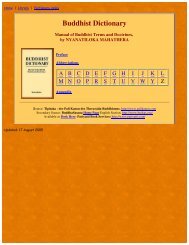Night and Morning with Bhikkhu Tissa
Night and Morning with Bhikkhu Tissa
Night and Morning with Bhikkhu Tissa
- No tags were found...
You also want an ePaper? Increase the reach of your titles
YUMPU automatically turns print PDFs into web optimized ePapers that Google loves.
<strong>Bhikkhu</strong> <strong>Tissa</strong>: This world is a put-together thing that depends on conditions, <strong>and</strong> we should try tounderst<strong>and</strong> it in order to remove suffering <strong>and</strong> attain peace. I don’t mean we have to torment ourselves <strong>with</strong>speculations about ultimate reality or unreality. What matters is underst<strong>and</strong>ing our experience as it happens,as it presents itself to us right in the present moment. The world we live in <strong>and</strong> need to underst<strong>and</strong> is,according to Buddhism, not a permanent entity but only the built-up result of innumerable conditions, whichwe are aware of through the functioning of our senses. Light falls on the eye, or sound on the ear, <strong>and</strong>consciousness occurs. Out of the many operations of our senses there comes to be our idea of the world.Gene: This world—I’m sure you’d agree—is full of all kinds of danger <strong>and</strong> suffering. I don’t see, in myown case, much hope of avoiding all of it, so I wonder if I couldn’t be more energetic <strong>and</strong> make better use ofmy time, so that at least I could have more real enjoyment from the world in order to make up for the pain.Perhaps just sitting around <strong>and</strong> thinking too much is unhealthy. Activity is a good thing, isn’t it?<strong>Bhikkhu</strong> <strong>Tissa</strong>: It depends on the quality of the activity. Conscious, wholesome deeds will certainly bringyou benefit. But do you really think that just being absorbed in activities, even pleasant or amusing or goodones, will free your mind from worry about the impermanence of life? Will dragonflies no longer upset you orinspire you?Gene (sighing): That I don’t know.<strong>Bhikkhu</strong> <strong>Tissa</strong>: If the idea of impermanence has occurred to you, <strong>and</strong> if you are concerned about thepassage of time <strong>and</strong> the need you feel for meaning, you have already made progress in the Dhamma, thetruths made known by the Buddha.Gene: Very little progress, it seems!<strong>Bhikkhu</strong> <strong>Tissa</strong>: Now then, to go further it’s necessary to return to primary matters.Gene: I don’t underst<strong>and</strong>.<strong>Bhikkhu</strong> <strong>Tissa</strong>: What does the Buddha teach first <strong>and</strong> return to again <strong>and</strong> again? The Buddha’s teachings,in all their vastness <strong>and</strong> complexity, are all directed toward one goal. What would you say that is?Gene: I would say, it must be the overcoming of suffering. Yes, suffering is the basic fact.<strong>Bhikkhu</strong> <strong>Tissa</strong>: Yes, that’s right. We mustn’t lose sight of that. The Buddha, you know, would not answerpurely speculative <strong>and</strong> metaphysical questions, because they are not useful in the great matter of doing away<strong>with</strong> dukkha, or pain, suffering, unsatisfactoriness. You are aware of this dukkha, I’m sure, or you wouldn’tvisit here or call yourself a Buddhist.Gene: That’s true. I’m just afraid I’m not prepared to make a direct assault, as it were, on this problem ofsuffering.<strong>Bhikkhu</strong> <strong>Tissa</strong>: The problem of suffering is not just going to disappear by itself, you know. The first of theFour Noble Truths that the Buddha penetrated was the truth of suffering. The Buddha had faced up to thissuffering <strong>and</strong> conquered it. Then he went on to explain how we also might conquer it. First, we mustinvestigate <strong>and</strong> underst<strong>and</strong> our situation as it really is. Now, while every thinking person is aware of sufferingto some extent, the Buddha saw the problem as going much deeper than the world usually believes.Gene: Yes, I underst<strong>and</strong> that. He saw dukkha in its true dimensions. He also saw what the rest of theworld did not—the cause <strong>and</strong> the solution of the problem.<strong>Bhikkhu</strong> <strong>Tissa</strong>: He did indeed. And what is the extent of this dukkha? Birth, old age, death. Afflictions ofall kinds, mental <strong>and</strong> physical. Illnesses, fears, doubts, regrets, longings. Loss of property, loss of relatives,failure, blame, poverty, grief—many, many kinds of suffering.Gene: That’s dukkha, all right. That about covers it!<strong>Bhikkhu</strong> <strong>Tissa</strong>: No, actually that doesn’t cover it. Those are only a few of the things that anybody can see asbeing suffering. The Buddha’s vision was much wider.Gene: Well, I mean, what else is there?<strong>Bhikkhu</strong> <strong>Tissa</strong>: This condition of dukkha—of suffering or unsatisfactoriness—has three aspects. There isthis familiar suffering that everybody knows—this pain or misery of body <strong>and</strong> mind. But there is another,5
















